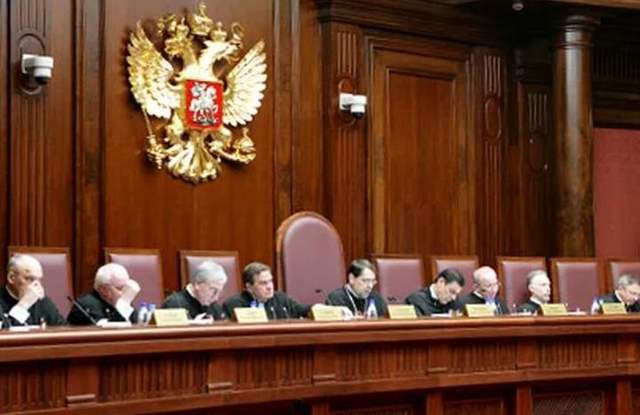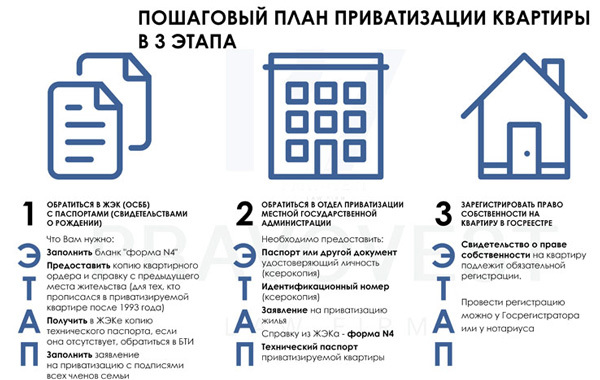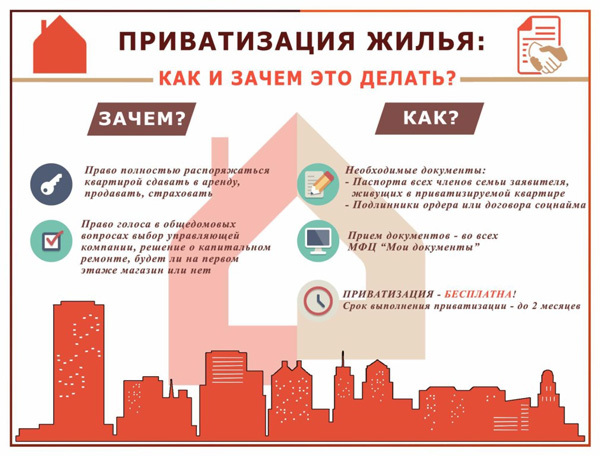

The period of limitation for the privatization of an apartment must be taken into account if the question of challenging or modifying the terms of the transaction has arisen, in which case the rules on the invalidation of transactions or their individual provisions, which are laid down in the Criminal Code of the Russian Federation, must be applied.
What is it?
The essence of privatization transactions is the transformation of the rights of residential property (a flat or a room) into the property of citizens, the conditions and procedure of which are regulated by Act No. 1541-1 of the Russian Federation, and the basic principles of the privatization programme are:
- Public access - every citizen living in a social home has the right to apply for ownership of the dwelling;
- One-time access to the privatization programme is granted to every citizen only once, and only minors are allowed to re-approach their housing rights;
- Free – legislation does not provide for the payment of the value of property transferred to the property of citizens.
As a result of privatization transactions, the interests of all citizens entitled to permanent use of housing are affected; moreover, the right to convert property into property will in some cases be enjoyed by citizens who do not actually live in an apartment (e.g. sentenced to long-term imprisonment).
Given the characteristics of the privatization programme, the following are the most relevant causes of the disputes:
- Undue exclusion of a certain number of persons from the ownership of a dwelling (e.g. non-inclusion into the ownership of citizens who have not lost their right to use the dwelling);
- Violation of the rights of minors, i.e. failure to include them in the application for a change of rights;
- Identification of cases of lack of credibility of information provided by citizens when seeking privatization;
- The determination of re-applications for participation in the privatization programme;
- Surrender of property to citizens excluded from privatization under Act No. 1541-1.
Based on these situations, various grounds for challenging privatization will be established, and in some cases the terms of the privatization contract may be changed by force.
The challenge to privatization transactions is only judicial, and the right of recourse to a court may arise for any entity whose rights have been violated by the illegal transfer of property to citizens ' property.
Rules of challenge
The privatization procedure is recognized as a free-of-charge civil transaction and will therefore be subject to the full terms and principles of the challenge, first of all, the invalidation of the transaction or part thereof. The general grounds for claiming the invalidity of the transaction are as follows:
- :: A fundamental violation of the provisions of the legislation, which impairs the rights and interests of citizens, as well as of State and municipal bodies;
- The conduct of a privatization transaction by a person not authorized to do so;
- The conclusion of a privatization contract by a citizen who has been declared legally incapable or has limited capacity;
- The commission of a transaction through deception or abuse of trust, as well as through violence or the threat of violence;
- Other grounds set forth in the norms of the Russian Criminal Code.
In each of these cases, the right of recourse to a court may arise for the various persons concerned - the other employers of the dwelling (e.g. family members), municipal authorities, guardianship authorities (if the rights of a minor are violated), etc.
Evidence of the facts to challenge privatization is the responsibility of the person claiming such a request, and various written evidence - forms, forms, certificates, judicial acts - may be used to prove that the person concerned has violated his or her rights and to demand that the terms of the privatization transaction be revoked or modified.
This is what needs to be taken into account when applying to the court to challenge the privatization contract:
- Only a person whose rights have been directly violated by a privatization transaction may file a claim before a court: other employers illegally excluded from ownership; municipal authorities who have lost ownership of an apartment as a result of unlawful acts; public prosecutors or guardianship bodies designed to protect the legitimate interests of certain categories of citizens;
- Such disputes fall within the competence of the ordinary courts (regional or city courts);
- There is no need to comply with the claim procedure in order to apply to the court for the cancellation or modification of the terms of the privatization transaction;
- All interested persons whose interests may be affected by the invalidation of privatization are involved in the proceedings;
- In order for a claim to be filed, the procedural limitation period, which is governed by civil law, must be respected.
The determination of whether a dispute can be considered on the merits will depend on whether the claimant has complied with the statute of limitations and whether the other parties to the proceedings have been required to leave the dispute. Consider the legal basis for resolving the issues.
Statute of limitations

The determination of the limitation period in the legislation allows for the determination of the length of time during which the person concerned may exercise his or her right to a judicial remedy; the expiry of the time limit does not mean that such a right will be completely lost, but it will depend to a large extent on the decisions and actions of other parties to the proceedings.
In order to render transactions null and void, there are special rules for the determination of time limits, which depend on the nullity or disputability of the transactions in question and are:
- Three years for transactions that are declared null and void by law (in which case claims will also include the application of the consequences of the invalidity of the transaction);
- One year for transactions subject to the signs of disputed transactions.
On the basis of the content of the privatization agreements, the unlawful deprivation of the right of individual citizens to own a place of residence would constitute a violation of their legitimate interests, in accordance with article 168 of the Code of Criminal Procedure of the Russian Federation, which makes the privatization transaction null and void, and the limitation period for challenging it would be three years.
The key point is the beginning of the current of the said period. In order to determine this, it is necessary to take advantage of the provisions of article 181 of the Russian Civil Code:
- As a general rule, the three-year period will begin to flow from the moment when the actual execution of the privatization transaction began, which will be the date on which the registration of citizens' ownership will be entered into the EGRN government;
- If the claim is brought by a person who was not a party to the privatization contract, the three-year period for recourse to the court shall begin to flow from the day on which the citizen became aware or should have been aware of the commencement of the transaction;
- In all circumstances, the time limit for challenging a transaction may not exceed 10 years.
Thus, the law establishes a sufficient period of time for the judicial protection of the interests of citizens whose rights have been violated by an illegal transaction; similarly, the statute of limitations applies if the claimant is the municipal owner of the housing stock or the guardianship authorities.
Features of the statute of limitations
If the claim is filed within the time limit set by the statute of limitations, it is subject to review on the merits, with the issuance of a judicial act; various legal nuances may arise when the three-year time limit is set for court proceedings:
- If the court found that a claim to challenge the outcome of privatization had been filed outside the three-year time limit, it could not refuse a citizen ' s consideration of the case and discontinue the proceedings at its own discretion;
- If a three-year time limit for the filing of claims has been missed and any party to the proceedings has declared this fact during the trial, the application shall be dismissed and the proceedings shall be discontinued;
- The possibility of an extension of the limitation period is permitted only if there are valid reasons for the delay, and the court will evaluate these arguments on its own conviction on the evidence submitted.
Thus, if the claim is brought before a court after three years from the date of the right of challenge, but none of the parties to the proceedings has stated this fact, the case will be considered on the merits on general grounds.
How to determine the correct beginning of the period of time?If a citizen was excluded from ownership at the time of privatization, he may not be aware of this fact for a long time.
For example, when serving a real term of imprisonment, citizens were objectively deprived of the opportunity to obtain reliable information on any action taken with his apartment, in which case he would only be able to learn about privatization from the moment he was released from prison.
In such circumstances, in the event of a dispute over the statute of limitations, the plaintiff would have to prove the time when he had had the opportunity to learn of a violation of his right.
The re-establishment of the statute of limitations takes place only in the courts and the person concerned must submit a statement or motion to that effect; at the same time, the court is provided with a full set of documents confirming respect for the late application for the defence of his or her interests.
Based on an analysis of case law, the grounds for the restoration of the statute of limitations will be:
- The complainant ' s long-term illness, during which he was prevented from going to court (e.g., being in hospital for long periods);
- Long-term travel outside the region or country;
- Staying in places of deprivation of liberty to serve a sentence under a criminal sentence;
- Service in the ranks of the Armed Forces of the Russian Federation or other similar groups.
The court may consider the reasons for the delay to be respected and other reasons for doing so; the court will examine the documents, forms and certificates submitted; all interested persons who have been given the right to object to the request will be invited to take part in the consideration of the application for restoration of the time limit.
If the statute of limitations is re-established by the courtthe case will be dealt with in accordance with the general rules and will result in a judicial verdict.The consequences of challenging privatization transactions may be:
- The termination of the contract and the return of the parties to their original state – the apartment will revert to municipal property and citizens will acquire the status of employers;
- Modification of the contract to include new owners and redistribution of shares;
- Modification of the contract by excluding individuals and appropriate allocation of shares to remaining owners.
If the transaction is declared null and void, employers do not lose the right to re-approach privatization, and all compulsory procedures will be conducted on general grounds under Act No. 1541-1.
Can the statute of limitations on privatization be restored?
 Privatization- The transfer of municipal property (entities, buildings, other premises or land) to private property, and the privatization of municipal property is possible once in a lifetime, but there are situations where the transaction can also be declared invalid.
Privatization- The transfer of municipal property (entities, buildings, other premises or land) to private property, and the privatization of municipal property is possible once in a lifetime, but there are situations where the transaction can also be declared invalid.
If a privatization transaction is declared invalid, the privatized property is returned to the property of the former owners. Should it be feared that the privatization transaction is illegal or invalid? What is the statute of limitations on privatization?
General
The statute of limitations (under article 195 of the Criminal Code of the Russian Federation) refers to the time limit provided by law for the protection of citizens ' rights in claims that reflect violations of these rights, i.e. the time limit for the protection of their rights, which is set by law separately in each particular situation.
The existence of a statute of limitations facilitates the timely submission of claims for the protection of violated rights and interests of citizens.
Reasons for avoidance of the privatization transaction
The avoidance initiative for the privatization of real estate may be based on:
- Persons whose interests have been affected by the transaction or their representative,
- State supervision bodies (procuratorship, guardianship and guardianship department, housing inspection, etc.),
- Local authorities that owned the privatized property.
Violations of rights during privatization include the following situations:
 No notification of privatization of registered persons in privatized real estate,
No notification of privatization of registered persons in privatized real estate,- The inclusion in the privatization process of a citizen who has already exercised his right of privatization and has deliberately hidden it from the participants in the transaction,
- Use of false documents for privatization or intentional distortion of data in documents
- Not to involve in the privatization of minors who are registered or living in the dwelling;
- Participation in the privatization process of a person who was in an incompetent or inadequate condition at the time the documents were signed
- The conclusion of a privatization transaction under pressure, threat or misleading one or more parties to the transaction,
- Exceeding the powers of a trusted person
- Lack of legal basis for the owner organization to undertake privatization.
A person who has a claim in the privatization process may file a claim with the court; the time limit for filing a claim before the court for the protection of his or her rights is calculated either from the time of the privatization or from the time the person concerned became aware of the infringement of his or her interests and rights.
For citizens who have not been parties to the transaction, the limitation period is 3 years from the time the transaction is concluded; in the case of an action to declare the privatization transaction null and void, the limitation period will depend on the recognition of the transaction as null and void; in the first case, the limitation period will be 3 years and, in the case of contested transactions, 1 year.
Changing the situation
The circumstances of the complainant
The limitation period may be extended if the applicant has objective circumstances:
- Treatment of a serious disease,
- A helpless position,
- Tough psychological condition due to the death of a loved one,
- Care for sick family members or relatives
- Service in the armed forces, et cetera.
APPLAUSE These circumstances may be taken into account by the court, provided that they have reached the time limit of limitation during the last six months and do not exceed the time limit, and if there are supporting documents.
In order to take into account the circumstances of the court that did not allow for the limitation period, a separate application should be filed, requiring that the circumstances of obtaining information on the privatization should be indicated, as well as the reasons why it had not been known earlier; the application should be accompanied by documents that would confirm the facts described therein.
The expiry of the statute of limitations does not mean that a citizen will not be able to defend his or her interests in court, but simply that the decision will take into account the actions and circumstances of other interested persons; in any event, the time limit for filing privatization claims is 10 years.
Evidence of the illegality or invalidity of the privatization transaction lies with the plaintiff; the evidence may be – official documents, inquiries, court decisions.
Important nuances in filing an action to declare privatization null and void
- Only the designated persons (citizens whose interests and rights were not respected at the time of privatization, the municipality as the former owner of the privatized apartment or the supervisory authorities of the State) may file an action.
- Disputes relating to privatization are dealt with in the ordinary courts,
- In the case of disputes over the cancellation or modification of the conditions of privatization, there is no claim stage,
- In filing a claim for cancellation or modification of the conditions of privatization, compliance with the statute of limitations is an important condition.
A court decision challenging the privatization transaction.
As a result of the proceedings, one of the following decisions in the suit may be rendered:
- Discontinuation of the privatization contract, return of the apartment to the municipality ' s property and to citizens of the status of the owner of the dwelling under the social employment contract.
- The modification of the terms of the privatization contract is the inclusion of persons who were previously illegally deprived of the right to privatize an apartment, resulting in a redistribution of ownership in real estate.
- The modification of the terms of the privatization contract is the exclusion from the transaction of citizens who have obtained the right of privatization illegally, as a consequence, of the redistribution of ownership of the apartment towards an increase for the remaining participants in the transaction.
On the basis of a court decision, property ownership rights are re-registered at the Rostreestra branch.
APPLAUSE if a transaction is declared invalid, the nationals who participated in the transaction retain the right to reprioritization on general grounds
The period of limitation for the privatization of the apartment in 2023 is a sample of minor children.
The issues of real estate now deserve special attention, and because of its high cost, citizens are trying to protect themselves from the loss of the property.
In any conflict of interest and in the event of a disputed situation, citizens of the Russian Federation have the possibility of resorting to a court of law, and some property-related matters are regulated through the same authority.
Main aspects
Recently, citizens have paid special attention to the privatization of housing into property, often in the case of municipal housing, which has been allocated for certain reasons.
However, the law sets a time frame within which real estate can be converted into direct ownership.

Citizens have a certain period of time during which they can privatize real property and dispose of it in full-time because of their property.
If the citizen has not completed the privatization of real property in a timely manner and he or she has other property where he or she can live, he or she is subject to eviction from a municipal facility.
Initial concepts
Before considering how the limitation period for the privatization of an apartment is established, some concepts that are closely related to this point should be considered:
| Privatization | Producing an immovable property into its direct property with the possibility of resale |
| Property | Type of possession of certain movable or immovable property that is documented |
| Sales contract | Document on the resale of certain property for that amount to another bidder |
| Statement of claim | Claimant ' s claims to the court in the form of a written statement drawn up in accordance with established rules and filed in a certain manner |
| Judiciary | Authorities responsible for resolving disputes, conflict situations and calling for accountability in the detection of offences |
| Defendant | A natural or legal person who acts in civil proceedings as a person responsible for violations of the rights of another citizen or organization |
In view of these concepts, it will be much easier to understand the substance of the issue of the statute of limitations for the filing of a claim for privatization of the dwelling.

What's the Impact?
The privatization of the dwelling is the establishment of the property in its immediate ownership, which has a direct impact on the following points:
- The dwelling is transferred to the full possession of the citizen;
- It may be remodeled or refurbished;
- The dwelling may be sold without difficulty;
- If the property was previously municipal, after privatization the State will not be able to seize the property.
The privatization of real property and the transfer of property to full ownership by a citizen have a direct impact on these points.
Legislative regulation
The determination of the limitation period for the privatization of immovable property is based on the following legal acts:
- Decision No. 29 of 11 December 2012 of the Plenum of the Supreme Court of the Russian Federation on the application by the courts of civil procedure legislation;
Limitation period on privatization
According to statistics, out of 50 privatizations, only 1-2 will be challenged and cancelled. In 30 years of this procedure, citizens have learned to deal with the issue legally, but let's find out where the privatization process can be declared null and void, and what is the nature of the statute of limitations?
The essence of the statute of limitations
The Civil Code (art. 195) states that the time limit for suit is that which the State has set aside for recourse to the courts and for the protection of its violated rights.
From a legal point of view, the claim would be nothing more than a way to protect its interests on any issue.
These periods generally vary according to the situation, but the law applies to any citizen who is present in the territory of the country.
The main point of the statute of limitations is:
- In case law, such a period is a long term, because the law does not have a specific time frame for resolving conflict issues, and there is a time limit within which recourse to the courts to defend their point of view will be not only relevant but also legitimate.
- The statute of limitations may be suspended and completed, e.g. if amendments to the bill have been introduced during the entire period of the statute of limitations, which in one way or another protected the plaintiff ' s rights;
- The statute of limitations is in place to speed up the process of resolving conflict situations: the family decided to privatize a room in a communal apartment, but the neighbouring owners opposed the procedure; the law does not require the approval of the neighbours because the procedure is purely personal; there is a time limit of 30 days where neighbours can apply to the court for a reasoned request to reject the privatization process;
- Although the statute of limitations allows for the defence of his rights if the plaintiff ' s health or life has been violated, if his rights, morals and principles have been violated, there are situations in which the period of time has not been applied; for example, if a life-threatening case has been recorded, the victim may apply to the court for compensation from the defendant within three years; after the time limit for the claim has expired, the court will not grant the claim.
What may be the claims for privatization?
There are dozens of claims to challenge the privatization process.
As a rule, the main sponsors of the rebuttal and cancellation of the registration of the owner ' s rights are former owners of the square, who, for one reason or another, were unaware of the outcome of the procedure.
There are cases in which guardianship authorities or local authorities interfere in the privatization process because the rights of children or persons with disabilities have been violated.
Basic list of claims to challenge privatization:
- The registration of rights may be contested by a family member who has not previously been notified in writing or who has not given a notary waiver or a confession that there are no claims to conduct a transaction; in this case, where there is no written refusal, the owners of the dwelling are entitled to bring a citizen into a free-of-charge contract without the knowledge of the person concerned.
- The registration of rights may be declared invalid if the claimant proves that the documents have been tampered with when applying to the local administration.
- The law does not allow for double privatization, except in cases where the first registration of rights took place as a child and the second after the age of majority; if the applicant has concealed the fact, the transaction shall be cancelled.
- If minors ' rights have been violated during the privatization process, the guardianship authorities, as well as the immediate relatives, may challenge the transaction and confirm that children ' s rights have been violated.
- Privatization should not be carried out under pressure, force or threat, a voluntary and non-binding procedure.
- Registration of rights would be declared invalid if the court found that a member of the family had been incompetent at the time of refusal, for example, under the influence of alcohol or drug abuse.
In simple terms, this period is a limited period of time during which a claimant has the right not only to challenge a transaction, but also in some cases to cancel it, to obtain compensation. In order to understand the time limit, it is necessary to refer to the legislative body:
- In accordance with the Civil Code (art. 196), the time limit for filing a complaint is three years, and it must be understood that there are exceptions which are determined by the higher courts in the courts when the time limit may be extended to 10 years;
- In the first case, attention is drawn to the Federal Act (art. 7, 1541-1), which stipulates that the city administration is obliged to issue to the applicant, upon approval of privatization, a transfer contract, which is subsequently issued to the Rosreest for the purpose of obtaining a certificate of State registration, with the inclusion in the contract of transfer of minors, especially if their legal representatives are subject to privatization; in the second case, attention is drawn to the Civil Code (art. 168), which states that the privatization procedure may be declared null and void if the interests and rights of citizens are found to have been violated.
We need to understand the difference between a disputed transaction and an insignificant transaction. If the situation is controversial, the plaintiff has every chance of winning the case by providing the court with a solid basis.
The nullity of the transaction is cancelled as soon as the violation is discovered, and the plaintiff will not have to prove the fact in court and gather arguments.
Could the statute of limitations be extended?
Under the law, the plaintiff is entitled to extend the statute of limitations if he or she has valid and valid reasons, the main one being the suspension of the proceedings due to the absence of the defendant and his or her location; in this situation, the proceedings may be suspended if the defendant has been found in the Armed Forces of the country.
Respectable reasons for challenging privatization:
- The complainant has received emergency medical care for more than three years and has been incompetent as a result of severe and chronic illness;
- The complainant had been in military service for more than three years and was not aware of the registration of property rights;
- The applicant has been incompetent for more than three years and has received assistance from a psychiatric clinic, as well as from a mental health centre, and if the complainant has been treated for alcohol or drug addiction, he must submit a certificate from a medical centre to the court;
- The applicant was a legally illiterate citizen; for example, immediately after his or her majority, the relatives privatized the dwelling, not only by not notifying the plaintiff but also by misleading him or her;
- If the plaintiff has been missing for more than three years.
Documents to be brought before a court of law
The principal document for filing a complaint is the application, without which the court will not be able to open the case, conduct an investigation and issue a verdict; in addition to the written application, the plaintiff is required to provide an additional list of documents:
- The plaintiff ' s identity document.
- A certificate proving the claimant's incapacity is necessary as proof that the defendant's actions were not lawful, and a certificate of disability, if any, would be appropriate.
- The receipts and bank statements, if the claimant was involved in privatization, paid the costs, but for some reason they were not included in the total number of registered owners.
- The birth certificate of children who had not participated in the registration of rights but whose rights had been infringed and violated.
- A bill of payment of the State duty of 300 roubles.
- Cadastral and technical plan for the disputed real property (if any).
- Legal documents that will help prove the plaintiff ' s involvement in privatization, such as a social employment contract issued by the municipal or public service.
Judicial practice
In case law, there is a list of the main reasons for the complainant ' s recourse to the courts, including:
- The agreement for privatization was signed by minors, although children after 14 years of age are legally entitled to familiarize themselves with the contracts, to study the legal side of the transaction and to sign a document, the entire procedure must be supervised by a legal representative, and the parent or guardian must certify the child ' s signature by his signature;
- The privatization agreement was signed under pressure, with the use of force, threats and destruction of property;
- If there are minors in the family, the privatization of the dwelling will require authorization from the guardianship authorities, and the State Child Protection Service will monitor the entire procedure in order to protect the rights of minors.
Conclusion one: in 90 per cent of all cases, the statement of claim is based on the personal objection of third parties to the participants in the privatization.
It must be understood that all claims are thoroughly analysed and, if a violation of the rights of the claimant or representative is found, the transaction will be considered null and void as well.
This means that no one will be able to challenge the registration procedure until all irregularities have been resolved.
Limitation period for privatization of an apartment
Based on an analysis of case law, the grounds for the restoration of the statute of limitations will be:
- The complainant ' s long-term illness, during which he was prevented from going to court (e.g., being in hospital for long periods);
- Long-term travel outside the region or country;
- Staying in places of deprivation of liberty to serve a sentence under a criminal sentence;
- Service in the ranks of the Armed Forces of the Russian Federation or other similar groups.
The court may consider the reasons for the delay to be respected and other reasons, for which the court will examine the documents, forms and certificates submitted.
Limitation period for illegal privatization of an apartment
It is important to challenge privatization transactions only through the courts, and the right of recourse may arise from any entity whose rights have been violated by the illegal transfer of property to citizens ' property. Our lawyers know the answer to your question if you want to know how to solve your problem, ask our duty lawyer online. It is quick, convenient and free! or on the phone:
- Moscow and Region: +7-499-350-97-04
- St. Petersburg and Region: +7-812-309-87-91
- Federal: 8 (800) 333-45-16 ext. 149
The rules of challenge The privatization procedure is recognized as a free-of-charge civil transaction and will therefore be subject to the full terms and principles of the challenge, first of all, the invalidation of the transaction or part thereof.
Limitation period for privatization of the dwelling
In order to confirm the facts as stated in the statement, the plaintiff must attach a package of documents, and it is very important that the statute of limitations, which does not exceed three years, be respected.In order to achieve this, the plaintiff must provide the following documents:
- Statement.
- A receipt of the payment of the mistress.
- It's an apartment certificate.
- The privatization agreement.
- List of evidence, for example, medical reports, witness statements and other certificates.
In the view of the lawyers dealing with this issue, it is not possible to draw up a single list of documents that would be able to deal with each case in the same way.
Time limit for privatization of the dwelling
They can do this:
- Members of the Public Prosecutor ' s Office or other supervisory bodies;
- The guardianship or social protection service;
- Persons (or their legal representatives) whose rights have been violated.
Example: Celiverstov, I.P., lived in a municipal apartment with his mother and sister. In 2007, he was convicted of a crime and sent to prison to serve his sentence. He was discharged from the apartment by court order. In 2010, Celiversto ' s mother died and his sister decided to privatize the apartment.
She applied for privatization only on her own behalf, providing a copy of the mother ' s death certificate and the apartment card, which did not include Celiverste I.P. The woman did not notify her brother of her decision to take possession of the dwelling.
A privatization contract was concluded with her and she received a certificate of ownership of the property.
How to challenge the privatization of the apartment
If a citizen retains the right to free privatization, the following package of documents will be required to be processed: the consent of all residents of the dwelling area The written refusal of a family member who does not wish to participate in privatization If a person takes part in privatization for the first time is excluded: minors who have the right to privatization for the second time in the Quarter are required to be privatized. The procedure for applying for judicial assistance falls under the constitutional law of all citizens of the Russian Federation. This is explained in detail in the Constitution of the Russian Federation: Article 46, para.1.2 "Every person shall be guaranteed judicial protection of his rights and freedoms." In order to make a request for a remedy, it is not necessary to have a legal entity; the court does not require that reference be made to regulations and legislation in force.
In doing so, the plaintiff will have to pay only the government.
What is the statute of limitations on privatization?
Together with the claim, such a package should be made available to the Office of the Court:
- The applicant ' s passport;
- The privatization agreement;
- An apartment card or an extract from a home book;
- An extract from a single register of real estate transactions;
- Documents confirming the illegality of privatization (judicial decisions, birth certificates, release certificate, other documents);
- A receipt for the payment of the State duty.
All documents could be attached as copies, but it was necessary to be ready to present the originals at the judge ' s first request, and if other certificates were required during the proceedings, the court would request them on its own or would require the parties to the proceedings to provide them.
- :: A fundamental violation of the provisions of the legislation, which impairs the rights and interests of citizens, as well as of State and municipal bodies;
- The conduct of a privatization transaction by a person not authorized to do so;
- The conclusion of a privatization contract by a citizen who has been declared legally incapable or has limited capacity;
- The commission of a transaction through deception or abuse of trust, as well as through violence or the threat of violence;
- Other grounds set forth in the norms of the Russian Criminal Code.
In each of these cases, the right of recourse to a court may arise for the various persons concerned - the other employers of the dwelling (e.g. family members), municipal authorities, guardianship authorities (if the rights of a minor are violated), etc.
As the claim to declare privatization illegal falls within the category of property but is not subject to assessment, the State duty of 300 roubles will have to be paid. Article 333 of the Constitution of the Russian Federation is fixed. The time limit for unlawful privatization will be confirmed by a judicial decision, but it is not possible to specify a precise time limit for the consideration of the claim. On average, in the district court of general jurisdiction, the proceedings last from 2 to 6 months, depending on the position of the parties, the sufficiency of the evidence, the appearance of the parties to the proceedings, and then the loser has the right to appeal the decision. When the verdict becomes enforceable, the regional office of Rosreestre will have to go to the regional office, and it will take about 14 days to process the documents.
This would require an appropriate statement of claim for unlawful ownership, immediately after a court decision, the registration of the contract of transfer of real property and the renewal of the plaintiff ' s registration records.
As a general rule, the entire process does not last more than five months; if the court is on the plaintiff ' s side after lengthy proceedings, the counterparties change the registration record of ownership of real property on their own.
In order to prevent the perpetrators from selling their housing, the real estate is subject to seizure, and the claim for restitution must be filed by the party to declare the privatization contract illegal.
This unlawful act, from the claimant ' s point of view, must be stated in the statement in full detail and the reasons must be sufficiently strong.
Period of limitation for privatization of the dwelling
Article 166 of the Russian Civil Code defines the conditions for declaring a transaction null and void; since privatization is in fact a legal contract, these grounds also apply to it.
There may be two cases of invalidity:
- In this case, the privatization agreement shall be null and void from the time of the conclusion of the transaction, for example if the transaction was entered into by a person who was not entitled to do so.
- Contestability of the transaction: This decision shall be taken only by the courts and the legal effects of the contract shall be deemed null and void from the moment the judgement is rendered.
A thorough examination of the matter does not always guarantee a positive outcome. On our website, you can obtain as much advice as possible on your question from our lawyers online or by telephone in Moscow (+7-499-350-97-04) and St. Petersburg (+7-812-309-87-91).
The statute of limitations provides for a period of time within which the person concerned may exercise his or her right to a judicial remedy; the expiry of the time limit does not mean that such a right will be completely lost, but it will depend to a large extent on the decisions and actions of other parties to the proceedings.
Special rules for the determination of time limits have been established to invalidate transactions.
Thus, the limitation period begins on the day on which the person became aware or should have been aware of the violation of his or her right, rather than on the day on which the performance of the negligible transaction began. Federal Act of 21.07.
2005 N 109-FZ "On the amendment of article 181 of part one of the Civil Code of the Russian Federation" establishes a three-year period of limitation on the application of the consequences of an nullity transaction, article 2 of which stipulates that the limitation period established by article 181 of the Civil Code of the Russian Federation (as amended by this Federal Law) on the application of the consequences of an nullity of a null transaction shall also apply to requirements previously established by the Civil Code of the Russian Federation for the presentation of which the time limit has not expired until the date of entry into force of this Federal Law.







